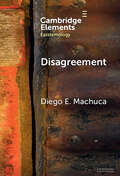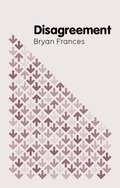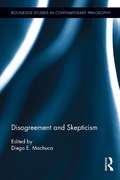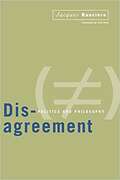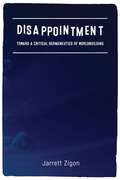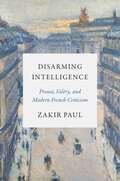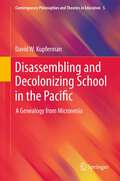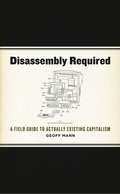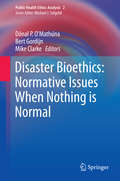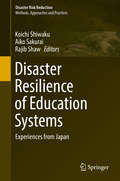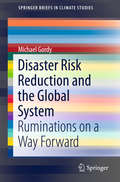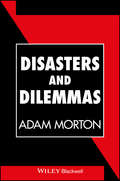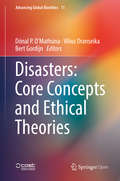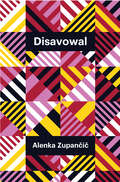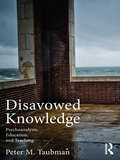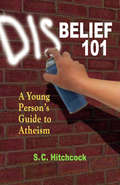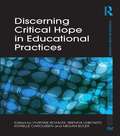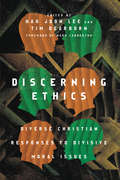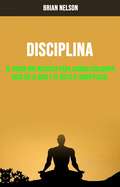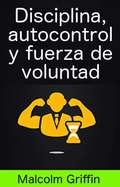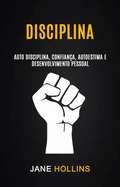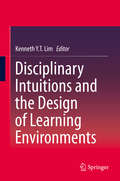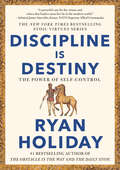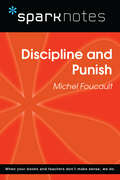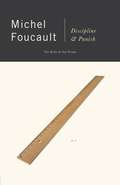- Table View
- List View
Disagreement (Elements in Epistemology)
by Diego E. MachucaThis Element engages with the epistemic significance of disagreement, focusing on its skeptical implications. It examines various types of disagreement-motivated skepticism in ancient philosophy, ethics, philosophy of religion, and general epistemology. In each case, it favors suspension of judgment as the seemingly appropriate response to the realization of disagreement. One main line of argument pursued in the Element is that, since in real-life disputes we have limited or inaccurate information about both our own epistemic standing and the epistemic standing of our dissenters, personal information and self-trust can rarely function as symmetry breakers in favor of our own views.
Disagreement (Key Concepts In Philosophy)
by Bryan FrancesRegardless of who you are or how you live your life, you disagree with millions of people on an enormous number of topics from politics, religion and morality to sport, culture and art. Unless you are delusional, you are aware that a great many of the people who disagree with you are just as smart and thoughtful as you are - in fact, you know that often they are smarter and more informed. But believing someone to be cleverer or more knowledgeable about a particular topic usually won’t change your mind. Should it? This book is devoted to exploring this quandary - what should we do when we encounter disagreement, particularly when we believe someone is more of an authority on a subject than we are? The question is of enormous importance, both in the public arena and in our personal lives. Disagreement over marriages, beliefs, friendships and more causes immense personal strife. People with political power disagree about how to spend enormous amounts of money, about what laws to pass, or about wars to fight. If only we were better able to resolve our disagreements, we would probably save millions of lives and prevent millions of others from living in poverty. The first full-length text-book on this philosophical topic, Disagreement provides students with the tools they need to understand the burgeoning academic literature and its (often conflicting) perspectives. Including case studies, sample questions and chapter summaries, this engaging and accessible book is the perfect starting point for students and anyone interested in thinking about the possibilities and problems of this fundamental philosophical debate.
Disagreement and Skepticism (Routledge Studies in Contemporary Philosophy)
by Diego E. MachucaThe thirteen essays in this volume explore for the first time the possible skeptical implications of disagreement in different areas and from different perspectives, with an emphasis in the current debate about the epistemic significance of disagreement. They represent a new contribution to the study of the connection between disagreement and skepticism in epistemology, metaethics, ancient philosophy, and metaphilosophy.
Disagreement: Politics and Philosophy
by Jacques RanciereWhat precisely is at stake in the relationship between “philosophy” and the adjective “political”? In Disagreement, Rancière explores the apparent contradiction between these terms and reveals the uneasy meaning of their union in the phrase “political philosophy”—a juncture related to age-old attempts in philosophy to answer Plato’s devaluing of politics as a “democratic egalitarian” process. <p><p> According to Rancière, the phrase also expresses the paradox of politics itself: the absence of a proper foundation. Politics, he argues, begins when the “demos” (the “excessive” or unrepresented part of society) seeks to disrupt the order of domination and distribution of goods “naturalized” by police and legal institutions. In addition, the notion of “equality” operates as a game of contestation that constantly substitutes litigation for political action and community. This game, Rancière maintains, operates by a primary logic of “misunderstanding.” In turn, political philosophy has always tried to substitute the “politics of truth” for the politics of appearances. <p><p> Disagreement investigates the various transformations of this regime of “truth” and their effects on practical politics. Rancière then distinguishes what we mean by “democracy” from the practices of a consensual system in order to unravel the ramifications of the fashionable phrase “the end of politics.” His conclusions will be of interest to readers concerned with political questions from the broadest to the most specific and local.
Disappointment: Toward a Critical Hermeneutics of Worldbuilding
by Jarrett ZigonIncreasingly, anthropologists, political theorists and philosophers are calling for imaginative and creative analyses and theories that might help us think and bring about an otherwise. Disappointment responds to this call by showing how collaboration between an anthropologist and a political movement of marginalized peoples can disclose new possibilities for being and acting politically. Drawing from nearly a decade of research with the global anti-drug war movement, Jarrett Zigon puts ethnography in dialogue with both political theory and continental philosophy to rethink some of the most fundamental ontological, political and ethical concepts. The result is to show that ontological starting points have real political implications, and thus, how an alternative ontological starting point can lead to new possibilities for building worlds more ethically attuned to their inhabitants.
Disarming Intelligence: Proust, Valéry, and Modern French Criticism
by Zakir PaulA critical account of the idea of intelligence in modern French literature and thoughtIn the late nineteenth century, psychologists and philosophers became intensely interested in the possibility of quantifying, measuring, and evaluating &“intelligence,&” and using it to separate and compare individuals. Disarming Intelligence analyzes how this polyvalent term was consolidated and contested in competing discourses, from fin de siècle psychology and philosophy to literature, criticism, and cultural polemics around the First World War.Zakir Paul examines how Marcel Proust, Henri Bergson, Paul Valéry, and the critics of the influential Nouvelle revue française registered, negotiated, and subtly countered the ways intelligence was invoked across the political and aesthetic spectrum. For these writers, intelligence fluctuates between an individual, sovereign faculty for analyzing the world and something collective, accidental, and contingent. Disarming Intelligence shows how literary and critical styles questioned, suspended, and reimagined what intelligence could be by bringing elements of uncertainty and potentiality into its horizon. The book also explores interwar political tensions—from the extreme right to Walter Benjamin&’s engaged essays on contemporary French writers. Finally, a brief coda recasts current debates about artificial intelligence by comparing them to these earlier crises of intelligence.By drawing together and untangling competing conceptions of intelligence, Disarming Intelligence exposes its mercurial but influential and urgent role in literary and cultural politics.
Disassembling and Decolonizing School in the Pacific
by David W. KupfermanSchooling in the region known as Micronesia is today a normalized, ubiquitous, and largely unexamined habit. As a result, many of its effects have also gone unnoticed and unchallenged. By interrogating the processes of normalization and governmentality that circulate and operate through schooling in the region through the deployment of Foucaultian conceptions of power, knowledge, and subjectivity, this work destabilizes conventional notions of schooling's neutrality, self-evident benefit, and its role as the key to contemporary notions of so-called political, economic, and social development. This work aims to disquiet the idea that school today is both rooted in some distant past and a force for decolonization and the postcolonial moment. Instead, through a genealogy of schooling, the author argues that school as it is currently practiced in the region is the product of the present, emerging from the mid-1960s shift in US policy in the islands, the very moment when the US was trying to simultaneously prepare the islands for putative self-determination while producing ever-increasing colonial relations through the practice of schooling. The work goes on to conduct a genealogy of the various subjectivities produced through this present schooling practice, notably the student, the teacher, and the child/parent/family. It concludes by offering a counter-discourse to the normalized narrative of schooling, and suggests that what is displaced and foreclosed on by that narrative in fact holds a possible key to meaningful decolonization and self-determination.
Disassembly Required
by Geoff Mann"Geoff Mann is a new breed of monkey-wrencher. He knows that contemporary capitalism has a perverse habit of dismantling itself and gives us a toolkit to build a new, more socially just edifice."-Andy Merrifield, Magical Marxism"Insightful and incisive, thoughtful and thorough, filled with new avenues for thinking about resistence. Pass this one by at your own peril."-Matt Hern, Common Ground in a Liquid CityTo imagine how we might change capitalism, we first need to understand it. To succeed in actually changing it, we need to be able to explain how it works and convince others that change is both possible and necessary. Disassembly Required is an attempt to meet those challenges, and to offer clear, accessible alternatives to the status quo of everyday capitalism.Originally crafted as a comprehensive overview for younger readers, Geoff Mann's explanation of the fundamental features of contemporary capitalism is illustrated with real-world examples?an ideal introduction for anyone wanting to learn more about what capitalism is and where it falls short. What emerges is an anti-capitalist critique that fully understands the complex, dynamic, robust organizational machine of modern economic life, digging deep into the details of capitalist institutions and the relations that justify them to unearth the politically indefensible and ecologically unsustainable premises that underlie them.Geoff Mann teaches political economy and economic geography at Simon Fraser University, where he directs the Centre for Global Political Economy. He is the author of Our Daily Bread: Wages, Workers and the Political Economy of the American West (2007) and a frequent contributor to Historical Materialism and New Left Review.
Disaster Bioethics: Normative Issues When Nothing is Normal
by Bert Gordijn Dónal P. O'Mathúna Mike ClarkeThis book provides an early exploration of the new field of disaster bioethics: examining the ethical issues raised by disasters. Healthcare ethics issues are addressed in the first part of this book. Large-scale casualties lead to decisions about who to treat and who to leave behind, cultural challenges, and communication ethics. The second part focuses on disaster research ethics. With the growing awareness of the need for evidence to guide disaster preparedness and response, more research is being conducted in disasters. Any research involving humans raises ethical questions and requires appropriate regulation and oversight. The authors explore how disaster research can take account of survivors? vulnerability, informed consent, the sudden onset of disasters, and other ethical issues. Both parts examine ethical challenges where seeking to do good, harm can be done. Faced with overwhelming needs and scarce resources, no good solution may be apparent. But choosing the less wrong option can have a high price. In addition, what might seem right at home may not be seen to be right elsewhere. This book provides in-depth and practical reflection on these and other challenging ethical questions arising during disasters. Scholars and practitioners who gathered at the Brocher Foundation in Geneva, Switzerland in 2011 offer their reflections to promote further dialogue so that those devastated by disasters are respected by being treated in the most ethically soun d ways possible.
Disaster Resilience of Education Systems
by Rajib Shaw Koichi Shiwaku Aiko SakuraiEducation is regarded as a cross-cutting issue for disaster risk reduction (DRR) through reviewing the Sendai Framework for DRR (SFDRR) 2015-2030. Mainstreaming Disaster Risk Reduction (DRR) in the education sector is one of the important efforts to enhance resilience in a community. DRR in the education sector not only focuses on provision of disaster education, but also includes securing a safe school environment, developing school disaster management plans, and building the capacity of school teachers and local educational officers. Japan, with its wealth of experience in DRR, has developed a good resilient system in its education sector, which has been tested and revised through experiences of past disasters. This book reviews the evolution of DRR in the education sector in Japan, including some of the recent developments after the 2011 Great East Japan Earthquake, focusing on DRR governance and practices in national policies, curriculum development and teacher training, community linkage, and international cooperation, to enhance resilience in the education sector. The primary target groups for this book are students and researchers in the fields of disaster management and DRR studies. Another target group comprises practitioners and policy makers, who will be able to apply the collective knowledge from this work to policy and decision making. The book provides an overview of the current research trends and furnishes basic knowledge on this important topic.
Disaster Risk Reduction and the Global System
by Michael GordyThis short manuscript is both a distillation of some of the latest work on disaster risk reduction and an interpretation of this distillation from the author's political economic perspective. It is based on information found in the flagship reports on disaster risk reduction of the United Nations. The book sums up and interprets issues of disaster risk reduction and makes them accessible to professional and non-professional readers alike, including governmental policy makers.
Disasters and Dilemmas: Strategies for Real-Life Decision Making
by Adam MortonThe author presents a number of strategies for making decisions based on desires or values which are incompatible or which conflict with one another in various ways. Cases discussed include conflicts of first and second order desires, conflicts between desires for present and for future ends, problems deriving from anticipated changes of desire, risk-taking problems, and coordination problems. One central claim of the book is that the same dilemma-managing strategies can be applied to all of these. The book also argues that many of the characteristics of moral dilemmas appear in non-moral decision-making. The relations between these strategies and utility-maximizing decision rules are subtle, and are explored throughout the book. To some extent the strategies apply to cases which are too complicated for utility-maximization to apply. Some of them also apply to the early stages of decision-making where utility-maximization does not enter, for example, in selecting a list of options for serious consideration. In some tidy cases, though, the strategies give different recommendations. This book is meant to have both a theoretical and a practical appeal, deriving from our need for ways of making decisions that do not force us to find trade-offs between goods or values which are hard to compare. The strategies presented in the book are meant to be usable in situations which seem to force decision-makers to balance very different quantities, and the discussion of them is meant as a contribution to debates about incomparable values, moral dilemmas and rational decision.
Disasters: Core Concepts and Ethical Theories (Advancing Global Bioethics #11)
by Bert Gordijn Dónal P. O’Mathúna Vilius DranseikaThis Open Access Book is the first to examine disasters from a multidisciplinary perspective. Justification of actions in the face of disasters requires recourse both to conceptual analysis and ethical traditions. Part 1 of the book contains chapters on how disasters are conceptualized in different academic disciplines relevant to disasters. Part 2 has chapters on how ethical issues that arise in relation to disasters can be addressed from a number of fundamental normative approaches in moral and political philosophy. This book sets the stage for more focused normative debates given that no one book can be completely comprehensive. Providing analysis of core concepts, and with real-world relevance, this book should be of interest to disaster scholars and researchers, those working in ethics and political philosophy, as well as policy makers, humanitarian actors and intergovernmental organizations..
Disavowal (Theory Redux)
by Alenka ZupančičThis book argues that the psychoanalytic concept of disavowal best renders the structure underlying our contemporary social response to traumatic and disturbing events, from climate change to unsettling tectonic shifts in our social tissue. Unlike denialism and negation, disavowal functions by fully acknowledging what we disavow. Zupančič contends that disavowal, which sustains some belief by means of ardently proclaiming the knowledge of the opposite, is becoming a predominant feature of our social and political life. She also shows how the libidinal economy of disavowal is a key element of capitalist economy. The concept of fetishistic disavowal already exposes the objectified side of the mechanism of the disavowal, which follows the general formula: I know well, but all the same, the object-fetish allows me to disregard this knowledge. Zupančič adds another twist by showing how, in the prevailing structure of disavowal today, the mere act of declaring that we know becomes itself an object-fetish by which we intercept the reality of that very knowledge. This perverse deployment of knowledge deprives it of any reality.This structure of disavowal can be found not only in the more extreme and dramatic cases of conspiracy theories and re-emerging magical thinking, but even more so in the supposedly sober continuation of business as usual, combined with the call to adapt to the new reality. To disrupt this social embedding of disavowal, it is not enough to change the way we think: things need to change, and hence the way they think for us.
Disavowed Knowledge: Psychoanalysis, Education, and Teaching (Studies in Curriculum Theory Series)
by Peter Maas TaubmanThis is the first and only book to detail the history of the century-long relationship between education and psychoanalysis. Relying on primary and secondary sources, it provides not only a historical context but also a psychoanalytically informed analysis. In considering what it means to think about teaching from a psychoanalytic perspective and in reviewing the various approaches to and theories about teaching and curriculum that have been informed by psychoanalysis in the twentieth century, Taubman uses the concept of disavowal and focuses on the effects of disavowed knowledge within both psychoanalysis and education and on the relationship between them. Tracing three historical periods of the waxing and waning of the medical/therapeutic and emancipatory projects of psychoanalysis and education, the thrust of the book is for psychoanalysis and education to come together as an emancipatory project. Supplementing the recent work of educational scholars using psychoanalytic concepts to understand teaching, education, and schooling, it works to articulate the stranded histories ─ the history of what could have been and might still be in the relationship between psychoanalysis and education.
Disbelief 101: A Young Person's Guide to Atheism
by Tom Flynn S. C. HitchcockFilled with wit, humor, and clear metaphor, this exploration into atheism is written specifically for young adults, though any adult interested in learning more about atheism will find value within. Not just focused on atheism, this crash course in logical thinking addresses the issues of indoctrination, whether it be religious, political, or commercial, and makes the case that morality is created through reasoning and logic, not through divine communication. Many hot topics are touched upon, such as traditional arguments for God’s existence, the relationship of evolution and religious belief, the incompatible nature of science and religion, and the harmfulness of both Christianity and Islam.
Discerning Critical Hope in Educational Practices (Foundations and Futures of Education)
by Vivienne Bozalek Brenda Leibowitz Ronelle Carolissen Megan BolerHow can discerning critical hope enable us to develop innovative forms of teaching, learning and social practices that begin to address issues of marginalization, privilege and access across different contexts? At this millennial point in history, questions of cynicism, despair and hope arise at every turn, especially within areas of research into social justice and the struggle for transformation in education. While a sense of fatalism and despair is easily recognizable, establishing compelling bases for hope is more difficult. This book addresses the absence of sustained analyses of hope that simultaneously recognize the hard edges of why we despair. The volume posits the notion of critical hope not only as conceptual and theoretical, but also as an action-oriented response to despair. Our notion of critical hope is used in two ways: it is used firstly as a unitary concept which cannot be disaggregated into either hopefulness or criticality, and secondly, as an analytical concept, where critical hope is engaged and diversely theorized in ways that recognize aspects of individual and collective directions of critical hope. The book is divided into four sub-sections: Critical Hope in Education Critical Hope and a Critique of Neoliberalism Critical Race Theory/Postcolonial Perspectives on Critical Hope Philosophical Overviews of Critical Hope. Education can be a purveyor of critical hope, but it also requires critical hope so that it, as a sector itself, can be transformative. With contributions from international experts in the field, the book will be of value to all academics and practitioners working in the field of education.
Discerning Ethics: Diverse Christian Responses to Divisive Moral Issues
by Tim Dearborn Hak Joon LeeRacism. Immigration. Gun violence. Sexuality. Health care.
Disciplina : El Poder Que Necesita Para Lograr Cualquier Cosa En La Vida Y El Éxito A Largo Plazo.
by Brian NelsonEl poder que necesitas para lograr cualquier cosa en la vida y el éxito a largo plazo La confianza en uno mismo es un aspecto interesante del carácter humano - es una definición de cómo nos vemos a nosotros mismos y al lugar al que pertenecemos en este mundo. Tener confianza en uno mismo es confiar en uno mismo para hacer y ser lo mejor que uno puede ser, independientemente de todas las circunstancias que encontremos en la vida. Me di cuenta de que muchos fracasaron en su intento de seguir adelante a largo plazo. Es muy evidente para mí que la motivación inicial se desvanece rápidamente a medida que la gente sigue con su vida cotidiana. Este libro es mi intento de que empieces con el pie derecho a medida que te embarcas en cambiar tus hábitos de manejo de dinero. Descubra los poderosos hacks mentales de autodisciplina que le permitirán duplicar su productividad y vencer la dilación. Las personas con una gran fuerza de voluntad y autodisciplina se distinguen del resto, siempre se les ve como los mejores ejecutores y siempre producen resultados. Con este libro, usted podrá dominar estas estrategias efectivas y tomar el control total de su vida. Si está listo para tomar acción y cambiar su vida para mejor, este libro definitivamente te guiará en la dirección correcta!
Disciplina, autocontrol y fuerza de voluntad: Todo lo que necesitas para cumplir tus sueños
by Malcolm Griffin.Este libro te guiará en el uso de herramientas sencillas y altamente efectivas que te permitirán desarrollar la actitud y diversos hábitos necesarios para convertirte en una persona más centrada, de modo que puedas cumplir cualquier meta que te propongas en el menor tiempo posible. Gracias a este libro aprenderás lo que significa realmente el autocontrol. Descubrirás cómo abordar y suprimir aquellos hábitos negativos que afectan tu disciplina. Con la ayuda de este libro desarrollarás el nivel de autocontrol necesario para cumplir con las metas que te propongas a través del empleo de las técnicas más efectivas. La mayoría de las personas quieren lograr la confianza, hábitos y mentalidad necesaria que conduzcan al éxito. Para muchos puede ser una tarea imposible. Sin embargo, hemos escrito este libro para que cuentes con su ayuda. En el audiolibro "Éxito, principios y hábitos" descubrirás a su vez los secretos que condujeron al mejoramiento de las vidas de otras personas. ¡Deslízate hacia el margen superior y hazte con tu copia ya!
Disciplina: Auto Disciplina, Confiança, Autoestima e Desenvolvimento Pessoal
by Jane HollinsEste manual irá ensiná-lo a ter alegria em cultivar a autodisciplina. Aprenda o que é, como obtê-lo, por que precisamos, como mantê-lo e por que queremos. Ele também cobre os principais obstáculos em nosso caminho, tanto interna quanto externamente. Se você deseja um impulso para autodisciplina com uma dose saudável de autoconfiança, pegue este manual hoje mesmo. Você não pode se dar ao luxo de não fazer isso. E se pudesse superar os desafios da vida e atingir qualquer meta que definisse em sua mente? E se pudesse desenvolver um foco tão poderoso que pudesse aumentar sua produtividade em dez vezes? Tudo isso pode ser alcançado através do desenvolvimento da auto-disciplina poderosa e este livro irá ensiná-lo exatamente como um guia passo a passo. Este é o único guia que você precisa sobre como formar e manter bons hábitos que irão mantê-lo feliz e realizado para o resto de sua vida. Pessoas de sucesso são a inveja de muitos. Eles são nossos modelos. Nós admiramos o sucesso deles, perguntamos como eles fizeram isso, e desejamos que pudéssemos ser iguais a eles ou replicar sucessos semelhantes em nossas vidas. Se você está pronto para agir e mudar sua vida para melhor, este livro definitivamente irá guiá-lo na direção certa!
Disciplinary Intuitions and the Design of Learning Environments
by Kenneth Y. T. LimMany of the chapters within draw frequent and explicit linkages to curriculum design, from the premise of the need to go beyond addressing the conceptions of learners, to seeking to understand the substrate upon which these conceptions are founded. The argument is made that this substrate comprises the particular set of lived experiences of each learner, and how - because these lived experiences are as tacit as they are diverse - designing curriculum around misconceptions and preconceptions alone would not lead to enduring understanding from first principles. From this perspective, Disciplinary Intuitions constitute an exciting field at the nexus of learning theories and curriculum design.
Discipline Is Destiny: The Power of Self-Control (The Stoic Virtues Series)
by Ryan HolidayThe instant New York Times, Wall Street Journal, and USA Today Bestseller!In his New York Times bestselling book Courage is Calling, author Ryan Holiday made the Stoic case for a bold and brave life. In this much-anticipated second book of his Stoic Virtue series, Holiday celebrates the awesome power of self-discipline and those who have seized it.To master anything, one must first master themselves–one&’s emotions, one&’s thoughts, one&’s actions. Eisenhower famously said that freedom is really the opportunity to practice self-discipline. Cicero called the virtue of temperance the polish of life. Without boundaries and restraint, we risk not only failing to meet our full potential and jeopardizing what we have achieved, but we ensure misery and shame. In a world of temptation and excess, this ancient idea is more urgent than ever.In Discipline is Destiny, Holiday draws on the stories of historical figures we can emulate as pillars of self-discipline, including Lou Gehrig, Queen Elizabeth II, boxer Floyd Patterson, Marcus Aurelius and writer Toni Morrison, as well as the cautionary tales of Napoleon, F. Scott Fitzgerald and Babe Ruth. Through these engaging examples, Holiday teaches readers the power of self-discipline and balance, and cautions against the perils of extravagance and hedonism.At the heart of Stoicism are four simple virtues: courage, temperance, justice, and wisdom. Everything else, the Stoics believed, flows from them. Discipline is Destiny will guide readers down the path to self-mastery, upon which all the other virtues depend. Discipline is predictive. You cannot succeed without it. And if you lose it, you cannot help but bring yourself failure and unhappiness.
Discipline and Punish (SparkNotes Philosophy Guide)
by SparkNotesDiscipline and Punish (SparkNotes Philosophy Guide) Making the reading experience fun! SparkNotes Philosophy Guides are one-stop guides to the great works of philosophy–masterpieces that stand at the foundations of Western thought. Inside each Philosophy Guide you&’ll find insightful overviews of great philosophical works of the Western world.
Discipline and Punish: The Birth of the Prison
by Michel FoucaultIn this brilliant work, the most influential philosopher since Sartre suggests that such vaunted reforms as the abolition of torture and the emergence of the modern penitentiary have merely shifted the focus of punishment from the prisoner's body to his soul.
